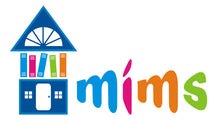3-BOOK METHOD OF CHOOSING A GREAT BOOK
The 3-Book Method
Thanks for coming to the MimsHouseBooks.com website! Today, we are highlighting why it's important to help kids choose a book to read.
In Scholastic’s 5th edition of the Kids and Family Reading Report, KIDS SAY:
- 91% My favorite book is one I picked out.
- 90% I’m more likely to finish a book I picked out.
- 73% say I’d read more if I could find a book I liked
- 45% I think it’s hard to find a good book.
Clearly we need to help kids learn to choose good books!
HOW TO PRESENT A BOOK CHOICE
First, it matters how you present the books!
When kids walk into a library, it’s easy to be overwhelmed with shelf after shelf of choices. They have too many choices!
The 3-Book Method
Here’s how to make it easy for kids to choose a great book—in only five minutes!
- Pull three books of different types (Example: one science biography, one hands-on experiment book, and one nature exploration book)
- Place them cover-up on a table.
- Let your child know there's no "wrong" choice.
- Give them 3-5 minutes to look through each one.
- Step back and let them choose one to check out.
This method has been particularly successful with STEM books, where children often feel pressured to pick the "smartest" option.
A VARIATION OF THE 3-BOOK METHOD: It’s also great to give kids a default choice. For example, you might say, “Lots of kids in your class have chosen_______this year. But you’re welcome to choose any of the three books.”
TRY THE 3-BOOK METHOD
Present a child with the three following books. Read the one-sentence description of each. Encourage the child to pick one book. Discuss why they chose that book and how this process can help them make good choices in other situations. (Click on the book covers for more in-depth information.)
George Washington's Engineer: How Rufus Putnam Won the Siege of Boston Without Firing a Shot.
NSTA BEST STEM BOOK
“…an empowering underlying message…regular people who became problem solvers…by working together, achieved an astonishing victory…A fascinating slice of American history…” Kirkus Reviews
“…a case study in how logistics can sometimes accomplish more in war than battles do…the lively tone of the narrative…” Booklist review
Field Notebooks: How Scientists Record and Write about Observations
Put scientists out in the field—where they observe and learn from their subjects—and exciting things happen. Join fourteen American scientists as they watch sleeping hippos, avoid cactus thorns, hide snakes under their skirts, make jokes, and draw elephants, termites or squids.
Starred Kirkus Review: “This well-crafted success story of a species’ salvation will encourage budding environmentalists.”

2022 Eureka! Nonfiction Honor Book (California Reading Association)
TRY IT NOW!
From Our Blog
Reading Mims House Books on Apps
Read more
2024 Award-Winning Books
Read more





